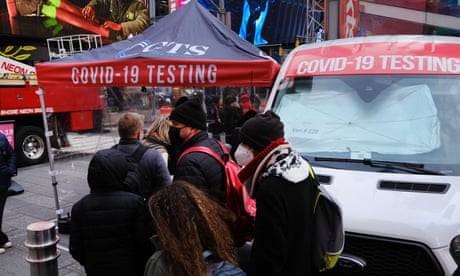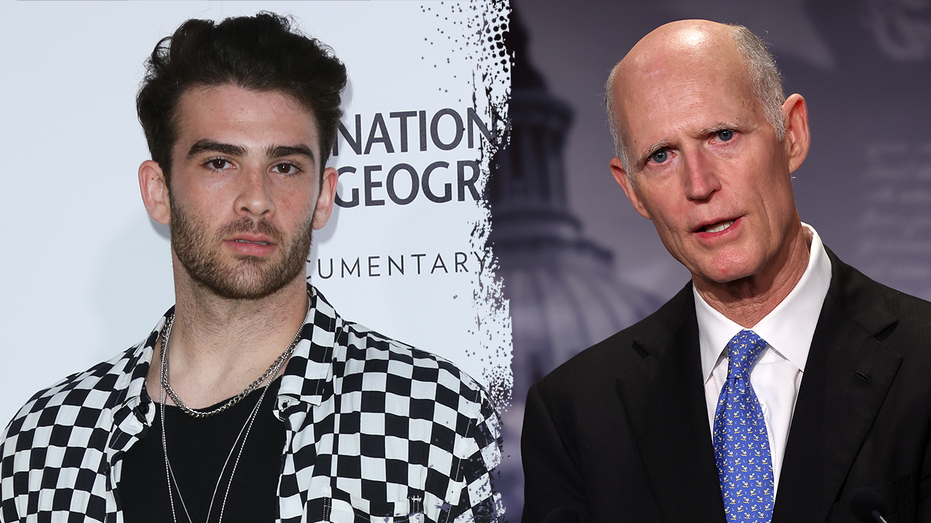- by foxnews
- 05 Mar 2025
Biden warns of ?winter of severe illness and death? for those unvaccinated against Covid
Biden warns of ‘winter of severe illness and death’ for those unvaccinated against Covid
- by theguardian
- 18 Dec 2021
- in news

Joe Biden on Thursday warned of "a winter of severe illness and death" for those not vaccinated against Covid-19, amid a wave of Delta infections and as new Omicron cases are beginning to surge in America.
The US president spoke as the Centers for Disease Control and Prevention (CDC) warned the Omicron variant could peak as early as January and states are scrambling to prepare for overloaded hospitals.
The US has passed 800,000 coronavirus deaths, including one in 100 Americans over the age of 65.
After a briefing on the pandemic from advisers on Thursday afternoon, Biden said Omicron is "now spreading and it's going to increase".
"For the unvaccinated, we are looking at a winter of severe illness and death," he said, urging Americans to get vaccinated and get their boosters as soon as possible.
The Omicron variant accounted for nearly 3% of Covid cases in the US as of Saturday - up from only 0.4% the week before, according to data from the CDC. The variant is expected to continue rising rapidly, based on the experiences of other countries and could be dominant within weeks.
In a meeting with state health leaders on Tuesday, the CDC presented two scenarios, based on models, for how the variant might drive infections in the next few weeks and months. Omicron and Delta cases could peak as soon as January or a smaller surge of Omicron could happen in the spring.
It's unclear which variant, Delta or Omicron, will dominate in the next few months or if they will coexist, Gounder said. Regardless, "we anticipate an increase in hospitalizations, an increase in deaths and an increase in the burden on the health care system over the next couple of months."
The US was already in the grips of a Delta wave that began before the Thanksgiving holiday, and officials fear that travel and gatherings over holidays like Christmas and New Year's could add explosive growth to an already strained situation.
Schools across the US are seeing rises in cases, and some are closing early or cutting back on in-person activities. In New York, Cornell University reported 903 cases among students this week - many of them cases of the Omicron variant among fully vaccinated people. The school closed early and went virtual.
In several states, hospitals are already close to being overwhelmed. In Michigan, intensivists are now volunteering to work for free in ICUs, one doctor reports.
"Healthcare systems need to have a plan in place for what will likely be a surge in hospitalizations in the coming weeks," Gounder said. "What are staffing plans, particularly over the holidays, when staff are going to want to take some time off themselves?" That may involve delaying elective procedures to reallocate staff, and working with agencies to bring in travel nurses and specialists as needed, she said.
Public health officials should ramp up testing and surveillance across the country, she said.
Some of the funds from the American Rescue Plan may be used at the state and local level for purchasing rapid tests, as Massachusetts and Colorado have begun doing. With Omicron, frequent testing may be more important than it was with previous variants, Gounder said.
"Omicron has an even shorter incubation period of two to three days. If you want to have a reasonable chance of catching most of those infections and being able to do something about it, you really need to be testing every day."
Between 15 and 30% of all positive tests should be sequenced to understand which variants are spreading across the country, Gounder said. "We've dramatically ramped up the volume of testing, but we're not where we need to be and it's still a bit patchy across the country." Wastewater surveillance can also be a "really useful tool to have your finger on the pulse of what's coming and how quickly."
Biden's national plan for addressing Omicron specifically excludes restrictions like stay-at-home orders and the majority of states have seen their local health powers significantly curtailed during the pandemic, making it more difficult to enact emergency measures to slow the spread of the virus.
Continuing to ramp up vaccinations, including initial doses and booster shots, will also be important to battling current and present waves. That will take a concerted campaign to educate the public on why it's important, for instance, to vaccinate newly eligible children.
Improving ventilation and air filtration is also important, and so is wearing high-quality masks, Gounder said. "People know about masks. They may not know, however, that KN-95s and KF-94s would be the preferred mask. How do you get them? How do you make sure they're the right kind?"
It is still too early to tell if Omicron is more or less deadly than previous variants. "The virulence really depends on the age of the person we're talking about, as well as other demographics, but age is probably the most important one," Gounder said. "With the early data coming out of South Africa, much of that was in young, relatively healthy, college-student-aged people."
But the evidence available does indicate the variant is more transmissible and immune-evasive, making infection more likely among those who are vaccinated or have recovered from earlier bouts with the virus. In the New York and New Jersey health zone, for instance, Omicron is present in 13% of cases.
Meanwhile, a panel of outside advisers to the CDC voted to recommend directing Americans towards the mRNA vaccines for protection against Covid-19 - meaning the shots by Pfizer/BioNTech or Moderna in the US - in preference to Johnson & Johnson's, because of the risks for blood clotting. The regulator still needs to sign off on the guidance.
- by foxnews
- descember 09, 2016
Popular travel destination breaks annual tourism record, sets new goal of 60M visitors
After breaking an annual tourism record in 2024, Japan looks to reach 60 million visitors by 2030. Officials tell Fox News Digital how Japan plans to attract visitors.
read more


